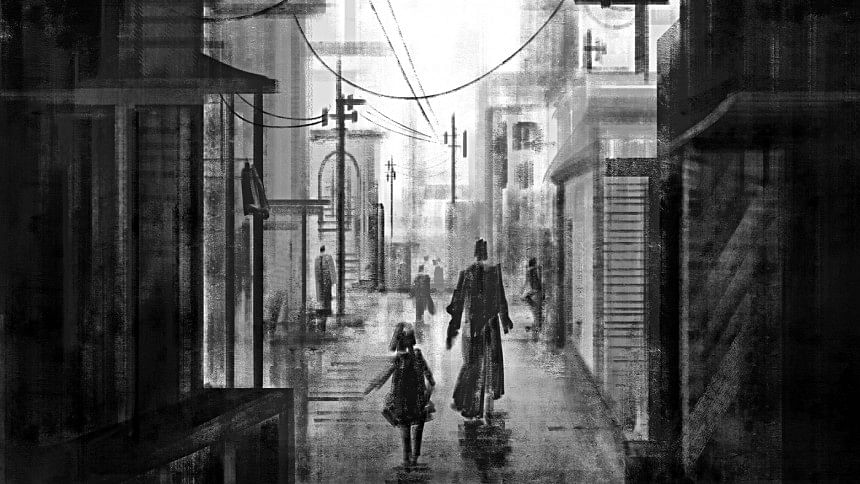Wanderers

It'd been so long since I last walked in this city.
Dhaka has been to me a blur of colours and faces as I used to drive my rickshaw from one end to another. At night it was a passing tunnel of yellow street lights and lamp posts. Wheeling through the mass of vehicles and people here, it was so easy to not think of anything. It was a routine of picking up passengers, speeding away and sweating. It was a routine of earning and living.
But today Dhaka was just a dead city, softly lit by the sun melting behind the clouds. After days of being locked down at home, eating scraps of food and wishing there was more money in the tin box where my wife, Rabeya saved our money, we were allowed to go outside for food. One of those organisations which once in a while knocked on our doors and gave us food were distributing food in a nearby schoolyard.
When I got there, there was already a huge queue of people, all ragged looking and thin, snaking its way ahead, though keeping a safe distance from each other, to the distributors. Scrunching my nose, I edged my mask up to it. Rabeya washed it tenderly three times a day because it's the only mask we have. Everyone has masks on, clean or not, except one little girl.
She stood before three or four persons before me, her small palms pressed determinedly on her mouth. The way she squirmed and tried not to touch anyone, looking down as the great snake of people inches forward proved she's here all alone. A sense of helplessness overwhelmed me as I realised she must be younger than my own daughter. Maybe she had an ailing parent back at home and so she was here to collect the staples.
"Hey, let that little girl go up front," my voice quivered a bit but I managed to say it anyway.
"Everyone's going to get food, so stop hustling around," the man who stood before the little girl said in a booming voice.
"But she has no mask on!" I tried to reason.
"Mind your own business, mister," a thin, bent-over woman screeched.
The girl tentatively looked back at me and pressed her palms firmly to her mouth. She kept on doing that every now and then as we all slowly moved ahead.
The school field looked like a haunted house for some reason without its children running around, the field barren without them playing. Jhorna, my daughter loved playing here too.
Time crawled and slowly the queue got smaller. But as we moved forward, we could see the distributors and they seemed kind of frenzied. They talked among themselves and motioned repeatedly to the pile of food that didn't seem enough for the remaining crowd.
Panic seized me. I was still behind some people and so was the small girl. I hoped that both she and I would get our food. The distributors were now decreasing the amount of rice grains and lentil seeds in the plastic bags in order to accommodate the remaining people there.
But the ration stopped just when the little girl walked to the front. There was no more food left.
The remaining people turn into an angry mob, raising fists and shouting for food. Only then the girl finally took her hands off her mouth and went to sit by a corner.
I thought of Rabeya, how she woke up early today and was smiling even because we were going to get food today, how Jhorna asked her mother to cook khichuri today. Today it proved again, without my rickshaw I cannot return with food.
For some reason my feet dragged me to the sobbing girl. Her hands were by her sides, they were no longer a makeshift mask for her.
"Come on Ma, I will buy you a mask," I said to the girl. I barely had money in my pocket, maybe a twenty taka note and a five taka note. The girl's big eyes stared at me with shock, her lips puckered up more and she renewed her sobbing. But she stood up and made an attempt to stand beside me. And we started to walk.
All around were people who walked back too, but all so different, some clasping the plastic bag of food because their lives depended on it. In front of us was a frail, old man returning empty handed. The distributors were returning too, hands shoved deep into the pockets of their aprons, the patrolling police officers urging us to go back home quickly.
Maybe I never noticed these people or this girl in my life, or maybe I did while paddling my rickshaw, while I breathed in Dhaka without ever seeing the clouds, while I earned my money without ever stopping for anything else, while we all lived here, never knowing why.
Maybe we were all just wanderers here, no one a wonderer.
You can reach out to Maisha Nazifa Kamal at [email protected]

 For all latest news, follow The Daily Star's Google News channel.
For all latest news, follow The Daily Star's Google News channel. 



Comments